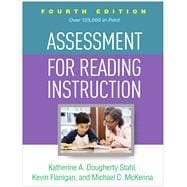New to This Edition
- Expanded coverage of the middle grades (4–8), including a new chapter and case study, and explicit attention to this grade range throughout; new coauthor Kevin Flanigan adds expertise in this area.
- New and expanded topics: computer-based testing methods, assessing academic language, and how to use reading inventories more accurately.
- Additional reproducible tools: informal reading inventory summary form, comprehension retelling forms for narrative and informational text, computer-based comprehension test comparison worksheet, revised Informal Decoding Inventory, and more.









